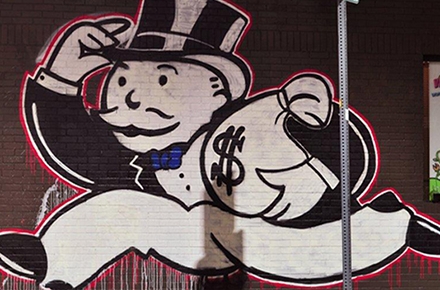Divine dash for cash
Papua New Guinea fraudsters are catching out unsuspecting citizens, through infilitrating Pentecostal church networks, writes BELINDA CRANSTON.
We’re all familiar with Nigerian email scams. Of the ‘windfall’ from a relative you didn’t know you had. Of the polite, though awkwardly worded request for your bank account details, so that the money can be transferred.
Most know better than to take any notice of such emails and part with their details online. Yet they continue to circulate.
And now they are a little closer to home, with Papua New Guinea joining the electronic dash for your cash.
Dr John Cox, a research fellow from the School of International, Political and Strategic Studies at the ANU College of Asia and the Pacific, was so intrigued by the manipulative techniques of fraudsters operating ‘fast money’ schemes in PNG towards the end of the 1990s, he made it the subject of his PhD research.
Since 1998, scammers on the Pacific island have persuaded hundreds of thousands of investors to part with more than US$208 million.
“Investors were lured with the promise of doubling their money in a short space of time, or by stories of others who had already been paid,” says Cox of those he met while conducting his research.
The biggest scam, a pyramid scheme known as U-Vistract Financial Systems, is still operating out of Bougainville 15 years after it entered the scene, despite the fact that since 2000, no investors have benefited financially.
The scam hit the headlines recently, when an American citizen was arrested for bringing fake currency into PNG. The worthless “money” was for the scammers, to pay their long-suffering investors.
Victims are not necessarily uneducated - most are from PNG’s middle class.
Even a police officer Cox met was defrauded of about 25,000 Papua New Guinea Kina (A$10,800).
“One of his colleagues, another police officer who was from Bougainville, introduced him to the scheme,” says Cox.
Another investor, a school teacher called Marie, told him “everyone I knew was in it”.
At the back of her mind, she “sort of knew” the scam was too good to be true, but nevertheless, “invested” a sum of money one month, and got a 100 per cent return the next.
“That’s how these scams work,” says Cox.
“The scammers promise a 100 per cent return.
“For a limited period, they can persuade investors that they are actually paying everybody.”
In Marie’s case, no money was lost, because she immediately decided to withdraw her money.
Less fortunate investors arranged for their money to be ‘rolled over’, believing it would continue to double.
When they eventually sought to obtain the money, however, they were given reasons as to why they needed to wait for it.
“They were told things like ‘there has been a computer glitch’ or ‘the PNG government is preventing the transfer of money to your bank accounts',” says Cox.
“A lot of those kinds of investors never saw their money again.”
Cox suggests U-Vistract may have lured some investors, simply by being forthright.
A massive meeting at Sir John Guise Stadium in Port Moresby in 2002 happened “right out in the open” and was full of prayers and assurances that investments were safe.
U-Vistract also appealed to investors’ moral consciences, through infiltrating Pentecostal church networks in particular.
Those who listened were told they could find personal fulfilment, through investing money in worthwhile projects like schools and clinics.
“It was most attractive to middle class Papuan New Guineans who identified as working class citizens - many were disgruntled by a lack of egalitarianism, corrupt politicians, and expectations that Papuan New Guineans should have been better off than what they were, given the resources boom,” says Cox.
A senior pastor at a big Pentecostal church in Port Moresby, Pastor Paul, told Cox he fell for the dodgy pyramid scheme, after being introduced to it by a Christian friend.
As is common in the Pentecostal movement, Pastor Paul believed in the “prosperity gospel” – a Christian religious doctrine that preaches financial success is the will of God for Christians, and that faith and good conduct, including donations to Christian ministries, will always increase one’s material wealth.
“One of the things about the prosperity gospel is that it really naturalises capitalism and the idea of personal investment,” says Cox.
“So there is nothing in that kind of Christianity that would make you think twice about this kind of thing.”
The Bank of PNG has been issuing warnings for nearly fifteen years but their efforts to notify people of the scams have been largely unsuccessful, even though the fraudsters were declared bankrupt in 2000.
In some instances warnings have encouraged people to take their money out of a bank and straight into a dubious pyramid scheme.
“They are gamblers or risk takers,” says Cox.
“They are of the view that pyramid schemes collapse quickly. They think, ‘if I get in quickly enough, then get out, maybe I’ll be one of the lucky ones who gets something out of it.'”
Cox recommends targeting social networks through which scammers operate, such as church groups, to clamp down on their activities.
"As we know from Bernard Madoff, Charles Ponzi and other famous conmen, the desire to be rich only needs to be packaged in the right way to seem feasible to people," he says.
"And that was the genius of the fraudsters behind U-Vistract - they took the desire for wealth and made it not only economically plausible, but turned it into a morally compelling vision of good people doing good things for their nation."







